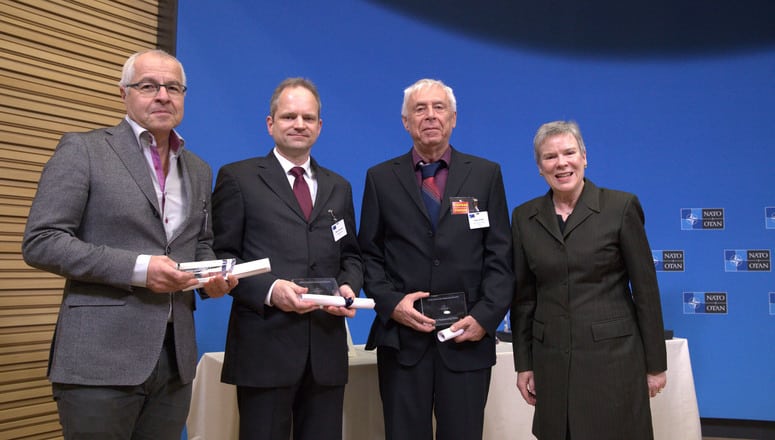Who is Prof. Otokar Grošek?
Four questions to the winner of NATO’s prestigious Science Partnership Prize in cyber security for 2018

From left to right: Prof. Viktor Fisher, Dr Rainer Steinwandt and Prof. Otokar Grošek receive the SPS Partnership Prize from NATO Deputy Secretary General Rose Gottemoeller for their project in the field of cyber defence.
What do you do?
“I am a Slovak mathematician and computer scientist and until May 2019 I was the Head of the Institute of Computer Science and Mathematics of the Slovak University of Technology in Bratislava. I have always been fascinated by science and always wanted to understand not only how things work, but why. In 1982, when cryptography became a public matter, I became deeply interested in this subject. I realised that a deep understanding of cryptography could help people feel safe, stable and secure. Security is, for me, a priority application field of science, especially since technology is becoming ever more pervasive in everyday life, and it is increasingly difficult for users to understand the potential security implications of their actions.”
What is your biggest challenge?
“One of the biggest challenges today is preparing information security systems to be able to resist so-called quantum attacks. In our connected world, communication networks are invaluable for the security of nations and individuals. Many communication protocols rely on cryptographic constructions that will no longer be secure if these mathematical problems turn out to be efficiently solvable by quantum computing. Thus, our research focuses on a new tool that will be able to resist both classical and quantum attacks.”
What are your most recent achievements?
“I was the NATO Project Director of the multi-year Science for Peace and Security (SPS) project «Secure Implementation of Post-Quantum Cryptography» and was awarded the 2018 Science Partnership Prize by NATO Deputy Secretary General Rose Gottemoeller. This project focused on the security of cyber infrastructures and communication channels. The project also involved members of the international science community, namely from France, Israel and the United States.
In May 2019, I was also named Slovak Scientist of the Year in the category “Figure of International Cooperation” for my work with the NATO SPS Programme. This prize was awarded by the Slovak Centre of Scientific and Technical Information, the Slovak Academy of Sciences and the Association of Slovak Scientific and Technological Societies under the patronage of the President of the Slovak Republic and the Minister of Education, Science, Research and Sport of the Slovak Republic.”
What is the value of the NATO SPS Programme?
“The SPS Programme beautifully intensified and expanded scientific collaborations at the international level. Freely speaking, as the director of these programmes, I sometimes find myself in a position similar to that of a coach of an elite national hockey league team, where each player is a great professional, able to do quality research, and my task is to coordinate them. Together we have the resources to tackle cryptographic problems that we would not be able to tackle alone. Through the Programme, we can offer our students the opportunity to contribute to impactful research, to work with and to be trained by international top experts whose expertise complements our own.”
«Scientists of NATO” introduces some of the experts involved with the SPS Programme. The Programme promotes dialogue and practical cooperation between NATO member and partner nations based on scientific research, technological innovation and knowledge exchange. It offers funding, expert advice and support to tailor-made, security-relevant activities that respond to NATO’s strategic objectives.
The NATO Science Partnership Prize is presented annually in order to recognise excellence in scientific collaboration between partner and NATO country scientists in activities supported by the NATO Science Programme. The Prize was awarded for the first time in 2002 and consists of a cash award to be used to support research activity.
















